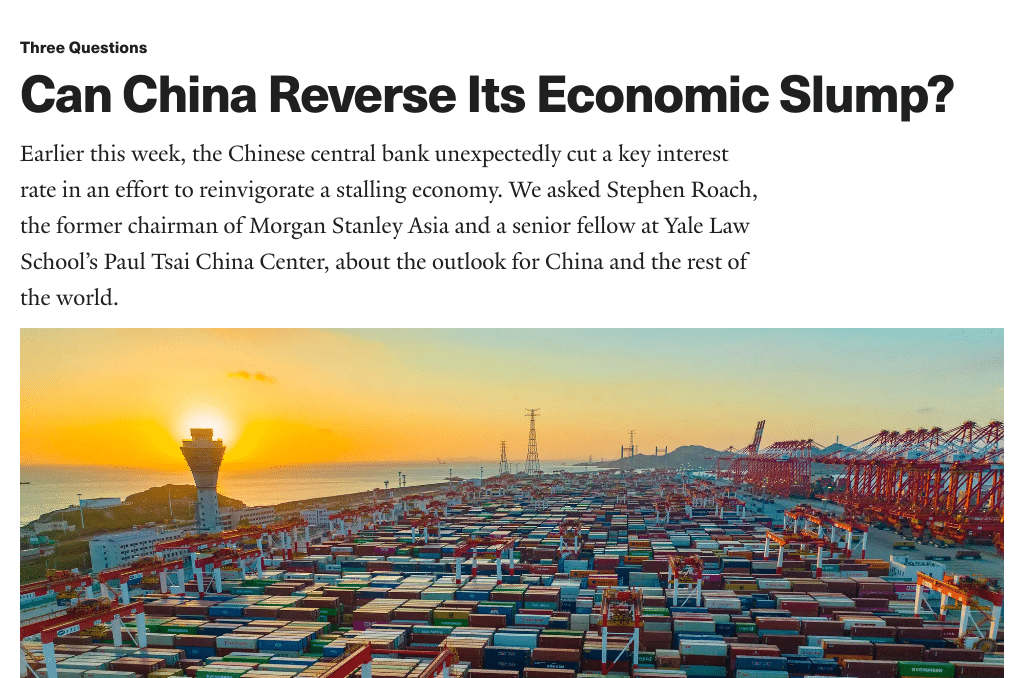China's economic slowdown is starting to have global repercussions, with potential negative spillover effects on economies worldwide. According to Euromonitor International, a sharper slowdown in China, particularly in consumer spending and investment, could result in slower global growth by 0.1-0.5 percentage points in 2023-2024 compared to the baseline. Developing economies, especially those with high trade exposure to China, would be most affected by this slowdown.
Euromonitor International's China Slowdown scenario reflects the impact of China's deteriorating short-term growth outlook and long-term growth potential on both China and the global economy. A deeper slump in China's property market and declining asset prices could lead to defaults, erode confidence in the financial system, and cause capital flight, currency depreciation, and rising unemployment.[0] Additionally, a faster population decline and slowdown in productivity growth would undermine China's long-term growth potential. Under this scenario, China's real GDP growth could decline by 0.3-1.2 percentage points in the first and second years.[0]
While a slowdown in China's economy will result in overall slower global growth, its impact on different economies and businesses will vary. Exporters to China and retailers in the country will be negatively affected by weaker business-to-business and private consumption growth.[0] China is a significant consumer of machinery, high-tech goods, and luxury goods.[0] Commodity exporters, particularly Latin American countries and Australia, will also experience a negative impact from slower growth in China.
China's economic slowdown poses potential risks to the rest of the world. While Beijing can mitigate the impact with stimulus measures, a prolonged slowdown could affect S&P 500 earnings, especially for commodities producers.[1] Additionally, China's woes could have a disinflationary impact globally, which is significant given the current state of monetary policy.[1]
The slowdown in China's economy is not merely a tactical issue but has wide-ranging implications. China's export-led growth, which has been driven by low-cost production, is losing steam.[2] China's contribution to global growth, which was substantial when its growth rate was around 8-9% per year, has now halved with its growth rate at around 4-5%. Furthermore, China's growth rate is expected to fall further in the coming years, potentially reaching a trend rate of around 2% by the end of the decade, similar to that of the US.[3]
China's economic growth has been a significant driver of global GDP growth since the global financial crisis of 2008-09, accounting for approximately 35% of the cumulative increase in world GDP. However, if China's growth trajectory slows further, its global impact will be reduced. The Chinese government's target of 5% growth for 2023 seems overly optimistic given the underlying weakness in the economy.[4] If China's economic growth averages just 3.5% over the next few years, the world could experience a significant shortfall in overall GDP growth.[4]
China's current economic slowdown is a departure from its previous decades of rapid growth. Stagnant consumer spending, a collapsing housing market, and a decline in foreign demand for manufactured goods have contributed to the severe slowdown.[5] China's debt levels are also a concern, with the overall debt-to-GDP ratio at around 300%, the highest among emerging markets and higher than most advanced economies.[6] The local government debt alone is estimated to be more than 70% of GDP, with many local governments struggling to pay interest on their debt.[6]
It is important to note that while China's economic downturn and debt problems are not at the level of Japan's crisis in the 1990s, China is unlikely to return to its pre-pandemic growth trajectory due to its aging population and structural demand issues.[0] However, there is an opportunity for more sustainable growth that is not reliant on a construction boom.[0]
In conclusion, China's economic slowdown is having a significant impact on the global economy, with potential negative consequences for trade and commodity linkages. Developing economies with high exposure to China will be most affected by this slowdown. The implications of China's economic slowdown are complex and wide-ranging, requiring careful attention from policymakers and businesses worldwide.
0. “China's Slowdown and Deflation Risks: Global Economic Implications” Euromonitor International, 18 Aug. 2023, https://www.euromonitor.com/article/chinas-slowdown-and-deflation-risks-why-it-matters-for-the-global-economy
1. “China's Debt Crisis Mounts As Everything Goes Wrong” Investor's Business Daily, 18 Aug. 2023, https://www.investors.com/news/china-debt-crisis-mounts-as-everything-goes-wrong-sp-500-risk-limited/
2. “David Rosenberg: The Great China slowdown has wider implications than meet the eye” Financial Post, 21 Aug. 2023, https://financialpost.com/investing/china-slowdown-what-investors-should-know
3. “China is too big for a Soviet Union-style collapse, but it’s on shaky ground” The Guardian, 20 Aug. 2023, https://www.theguardian.com/business/2023/aug/20/china-too-big-soviet-union-collapse-growth
4. “Can China Reverse Its Economic Slump? | Yale Insights” Yale Insights, 17 Aug. 2023, https://insights.som.yale.edu/insights/can-china-reverse-its-economic-slump
5. “China Is Now Growing Slower Than the U.S.” The Overshoot, 16 Aug. 2023, https://theovershoot.co/p/china-is-now-growing-slower-than
6. “Why the Chinese economy hasn't recovered after COVID lockdowns” NPR, 16 Aug. 2023, https://www.npr.org/2023/08/16/1193711035/china-economy-tao-wang-interview


